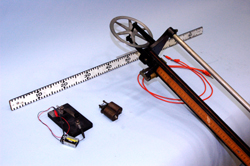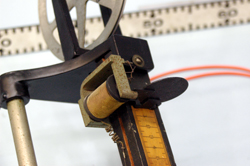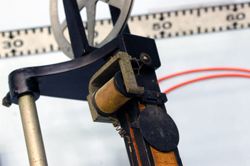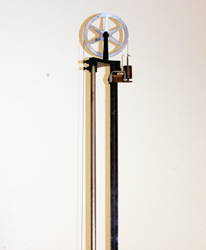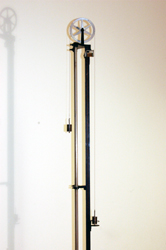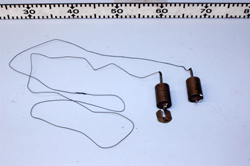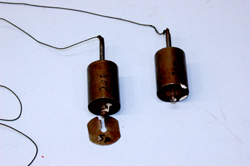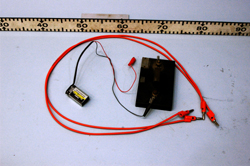Atwood's Machine, 1G10.40
Topic and Concept:
Newton's Second Law, 1G10. Force, Mass, and Acceleration
pira200 Listed
Location:
Floor Item: ME, East Wall
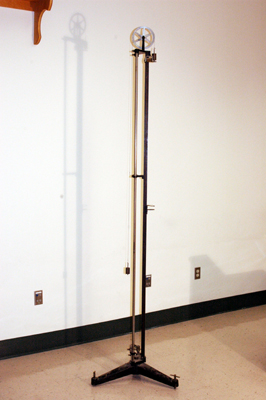
Abstract:
Two equal masses are hung from a pulley. A small amount of mass is added to the hanging weight on the front side. A timer is used of measure the free fall time of the the front mass over a distance of one meter.
Equipment |
Location |
ID Number |
|
|
|
Atwood Machine |
Floor Item: East Wall |
|
Twin 500g Weights with string |
ME, Bay A1 , Shelf #3 |
|
Small 5g Weight |
ME, Bay A1 , Shelf #3 |
With Twin Weights |
|
|
|
Important Setup Notes:
- Make sure the Atwood stand is plum.
- The Atwood stand is more then 2 meters tall and must be held at an angle within the elevator.
Setup and Procedure:
- Plum the Atwood Stand by adjusting the 3 leveling screws on the base.
- With a step stool, set the string that holds the weights over the pulley so that there is one weight on either side of the Atwood Machine.
- Make sure the small 5g mass is on the front, main mass.
- Connect a 9 volt battery to a momentary switch to operate the electromagnet that holds up the weight platform at the top of the Atwood Machine.
- Test the electromagnet. Make sure that it releases the weight platform so the weight is free to fall.
- Reset the weight platform by moving the front mass up to the top of the Atwood stand and raising the weight platform under the weight. The platform will lock into place with a click.
- Slide and Set the stopping platform so that there is one meter between the two platforms (i.e. One meter of free fall distance).
With the table display and and DMM set for "Stop Watch", one can measure the time it takes for the weight to fall one meter. The multi-purpose counter can also do this task equally well.
- Do this 3 or more times and take the average.
Cautions, Warnings, or Safety Concerns:
- N/A
Discussion:
Before the extra weight is added to the front mass, the two masses are equal and therefore the tension in the string on both side of the pulley is equal to weight of that hanging mass. Thus, the net force on each hanging weight is zero and the system remain stationary(ie. no rotation of the pulley). Once a small amount of weight is added to the front mass, the net amount of force on each mass will be the weight of the added mass. The direction of the net forces will be different for each mass. The rear mass will move upward since the tension is greater than its weight. Likewise, the front mass will move downward since its total weight is greater than the upward tension. Since the added mass is small, the acceleration of the system will be small.
|
|
|
|
|
|
|
|
Videos:
References:
